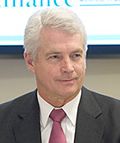We asked a number of leaders in environment and sustainability issues to imagine they found themselves in an elevator with the president-elect — giving them one minute of his undivided attention. Here are their messages to Obama about how he should approach environment, energy, and climate policy. (For more perspectives, check out Part 1 and Part 2 of our elevator-pitch series.)
—–

Majora Carter, environmental justice advocate and president of the Majora Carter Group:
"Horticultural infrastructure is the key to climate change adaptation and mitigation in our cities and rural coastlands. When we use well-designed plant systems to manage the storm water that washes out of city sewer systems and in from ocean storms, we can cool our cities, we can save energy, we can clean the air and water, and we can employ the ‘unemployable’ on career paths that can lead individuals into all sorts of productive activities. Right now, we incarcerate one in three black and Latino men in this country. Aside from this morally untenable direction, it costs a lot of money. Let’s be the ones who turn that pattern around, and make heroes out people who some just see as problems."
—–

David James Duncan, author:
"If I were in an elevator with Obama for 60 seconds, I’d shut my eyes and discretely join my palms and silently bless his heart and soul, and say protection prayers, and thank him for his courage. I wouldn’t ask one damn thing. What he has done, in the time and in the skin in which he’s done it, has been heroic beyond any American leader of my lifetime except Martin Luther King, Jr. So I’d just beam, and maybe whisper, as we were leaving, ‘Thank you.’"
—–

Van Jones, author of The Green Collar Economy and founder of Green For All:
"President-elect Obama, during the last great crisis, FDR created the Civilian Conservation Corps to put people to work tackling the economic and environmental challenges of his day. Today, we need you to establish a Clean Energy Corps to help us meet our modern challenges. You should task this Corps with retrofitting and repowering America. It would have three components: The first would be fully-funded "green community service" programs; for example, getting volunteers plugged in to plant trees and gardens. The second would be "green job training" programs; for example, trainees would learn how to install solar panels, weatherize buildings, and do green construction. And lastly, green jobs; the federal government would invest heavily in renewable energy and energy retrofits for buildings. Much of this work would pay for itself in energy savings. Such an effort would jumpstart the economy. To learn more, please check out the Green Recovery report from the Center for American Progress."
—–

Tim Wirth, president of the United Nations Foundation and the Better World Fund:
"Congratulations. What a great opportunity you have to renew the country and the world. No doubt citizens here and abroad are facing tall challenges — to their economic, security, and environmental wellbeing. But you have the enormous opportunity — and responsibility — to respond to them simultaneously by initiating the transition to a new energy economy. No other priority holds the same potential to secure our energy independence, create new jobs and economic progress, confront climate change, and reestablish American leadership in the world. Creating a new energy economy should be the overriding priority of your administration."
—–

Ron Steenblik, analyst on trade and the environment:
"First of all, let me congratulate you on your election to the office of the president. I do not need to tell you how high the expectations about your soon-to-be-installed administration have grown. Your fellow citizens — not only in America, but also of the wider community of nations — expect big things. And among the parts of the world to which you have given hope is Africa.
"As somebody with roots in that continent, somebody who cares about it, you know how many desperately poor people live there. There are numerous historical and contemporary reasons for that poverty. But what you may not be fully aware of is the link between poverty and environmental degradation. The two often aggravate each other in a vicious circle.
"You will, naturally, have your hands full enough dealing with problems at home, and in places like the Middle East. But please keep Africa a high priority. Help it to help itself, especially in developing its agriculture, renewable-energy infrastructure, and water and sanitation systems. Ask yourself, when you propose the next Farm Bill or have to decide whether to continue to support domestic production of biofuels made from food crops, how will this affect sub-Saharan farmers, or the tens of millions of Africa’s urban poor? And be generous when it comes to trade in products from Africa (and from Latin America while you’re at it).
"You can be a bridge to Africa. Heaven knows they need one."
—–

Kassie Siegel, director of the Climate, Air, and Energy Program for the Center for Biological Diversity:
"My greatest hope from your presidency is rapid action on the climate crisis, because leading scientists tell us that unless we can get our country and the world on a path to reducing CO2 concentrations to below 350 parts per million, we’ll face catastrophic impacts. Failure to deal with this global crisis will undo any other environmental or economic progress we make during your administration. By enforcing successful environmental laws like the Clean Air Act and Endangered Species Act to reduce emissions, we can make real progress now, before it’s too late for the Arctic, for polar bears, and for hundreds of millions of people in this country and around the world as well."
—–

Dave McCurdy, president and CEO of the Alliance of Automobile Manufacturers:
"The current economic and financial crisis presents the new administration an opportunity to unite the largest manufacturing sector in America, the environmental community, labor, governors, and Congress behind a comprehensive approach to energy and climate change. Automakers want to be part of the solution and are committed to improving fuel economy and reducing CO2.
"Sustained progress in producing the next generation of technology and vehicles to meet the challenges of fuel economy and CO2 reduction requires a healthy, competitive auto industry and clear national leadership. Our industry will be on the leading edge of the new energy economy. Our engineers and designers continue working toward the next technology breakthroughs that will even further reduce oil dependence and carbon dioxide emissions. Our work toward meeting a national solution could create the biggest wave of "green jobs" our nation has seen.
"To get this industry back on track and begin meeting these challenges, we need the certainty of a single national standard set by the federal government, fast-tracking of the loan guarantees to help automakers retool for the next generation of fuel-efficient autos, and an economic stimulus plan that includes steps to help consumers get back into auto showrooms, such as increased credit availability and efforts to spur consumer sales."
—–

Jessy Tolkan, co-director of the Energy Action Coalition:
"President-elect Obama, we, the young people of this country, turned out in record numbers this election season; we turned out not only to vote for you, but to vote for a clean and just energy future, and now it’s time to get to work. Let’s address our energy crisis and our economic crisis with a new green economy. President-elect Obama, we are ready to create 5 million new green jobs that rebuild and retool our nation; we are ready for you to use your authority to tell the EPA to do its job again. We need you to head to Poland immediately and reengage in the international community and help the United States to lead the way toward an international climate agreement. We are a growing youth climate movement that’s not going anywhere; we will hold you accountable. We will help you to see that the only clean coal is no coal and that "yes we can" have a 100 percent renewable energy future without coal, oil, or nuclear energy. The stakes are incredibly high and we are here to help you lead this country into the clean energy future."
—–

Jeff Flocken, D.C. office director for the International Fund for Animal Welfare:
"It will take time, energy, and a renewed commitment to conservation if we are to put our tattered system of conservation laws and policies back together and stem the tide of extinction that is once again rising in the United States and around the world. The Bush administration’s philosophy of focusing on the utilization of wildlife populations and habitat under the guise of "sustainable use" ignores the intrinsic value of each animal and its interconnected place in the world. This way of thinking has allowed, during the last eight years, shameful and unsustainable human activities once thought to be dead to slowly rise again: commercial whaling, the brutal seal hunt, the elephant ivory trade, the farming of tigers, the extermination of wolves, trophy hunting of polar bears and countless others, as well as the exploitation of public lands and waters to the detriment of common wildlife, endangered species, and even recreational enjoyment by citizens
"The American people have always been opposed to these things and, until recently, American leadership has been vital to recovering the world’s wildlife heritage. In the last century, Americans passed the landmark Endangered Species Act, the Marine Mammal Protection Act, the Wilderness Act, and the National Environmental Policy Act. Americans pushed for the Convention on the International Trade in Endangered Species, the International Whaling Commission’s ban on commercial whaling, and the Kyoto Protocol on greenhouse gases.
"We can do it again. If we are to regain the ground we have lost for wildlife and move forward in the face of global warming, we must decommericalize our wildlife conservation and habitat policies, and instead do all we can to protect these incredible species and their habitats while there is still time."
—–

Chris Murray, senior counsel for the Consumers Union:
"The new administration has tremendous opportunities to increase this country’s energy independence, and in doing so, save consumers’ money and improve the environment. It will be less expensive for consumers in the long run if our energy needs are met with cleaner technologies.
"The United States should be leading the world in energy innovation, rather than importing smart energy technologies from countries like Germany and Japan who already have made great strides on solar, wind, and clean energy storage. Likewise, the U.S. can create green jobs by building clean autos and other clean technology here at home.
"To accelerate that transition, it’s critical that the U.S. join the rest of the industrialized world in committing to strong limits on greenhouse gases. Accordingly, what’s the plan for COP 15 in Copenhagen next December? What’s the administration’s plan for quarterbacking the domestic implementation of the agreement through the Senate? How can we help?"

